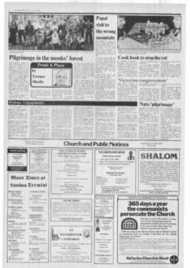Page 3, 16th September 1983
Page 3

Report an error
Noticed an error on this page?If you've noticed an error in this article please click here to report it.
Tags
Share
Related articles
New Head In Rome
Unique Move On Communion In America
Rome Caution • • Is Right Path
Reconciliation In Faith
A Turbulent Decade For The Church
News Analysis Vatican aiming to curb lay priests
THE VATICAN'S new statement that only sacramentally ordained priests can consecrate the Eucharist has ecumenical and other implications that go beyond the immediate question it addresses.
The new document, released on Thursday last week is a letter to the world's bishops by the Vatican's Congregation for the Doctrine of the Faith.
The basic teaching it contains, that no one but a duly ordained priest has the power to celebrate Mass, is not new in the Catholic Church. It was formally spelled out as Church teaching by the Fourth Lateran Council in 1215 and reaffirmed several times in the teachings of the Second Vatican Council, 1962-65.
In 1973 and 1975 the doctrinal congregation issued declarations affirming the teaching in response to writings by Fr Hans Kung, the controversial Swissborn theologian. The newest document mentions no names but appears to have been prompted by the writings of Belgian-born Dominican Fr Edward Schillebeeckx challenging traditional concepts of sacramental ordination.
It is not the Church teaching on sacramental ordination itself but the way it is expressed in the new document that may well draw the most attention from theologians. ecumenists, bishops, priests and catechists.
For bishops, priests, theologians and catechists, the document contains warnings against undervaluing the sacraments of orders and the Eucharist in theological writing and catechetical teaching.
For Catholics in general there is a sharp warning against
THE VATICAN has condemned attempts by lay people to say Mass. Jerry Filteau reports on the wider implications.
viewing the celebration of the Eucharist as "simply the action of the local community" or as nothing more than "a fraternal celebration in which the community comes together and gives expression to its identity."
The Eucharist, the document says, is "the sacramental renewal of the sacrifice of Christ." Mgr Richard Malone, executive director of the United States Bishops' Committee on Doctrine, said that, in his view, American religious education today tends to neglect the sacrificial, sacramental aspects of the Eucharist and place too much emphasis on its "fraternal celebration" aspect.
That, he said, presents a more serious and widespread pastoral problem in the United States than the question of the need for an ordained priest to preside at the Eucharist, which the new document is aimed at.
Novel form
For ecumenists, the novel form of the letter may be of the most interest. In the ecumenical movement the style of Rome's leadership in questions of faith and morals is watched almost as closely by other churches as the content of the teaching.
Instead of a "declaration" addressed to the Catholic world at large, such as the doctrinal congregation has traditionally issued when dealing with issues of this type, the new document is a "letter" addressed to the world's Catholic bishops.
The congregation offers its doctrinal reflections out of what it calls "a desire to offer its particular services to the bishops in a true collegial spirit . . . to assist them in the ministry of feeding the flock of the Lord with the food of truth." It stresses the "responsibility of the bishops" to preserve correct teaching and practice within their local Churches and to maintain the unity of the local Church with the universal Church.
"Let this collegial concern (of all the world's bishops) find such a concrete application that the undivided church, even in the variety of local churches working together, may keep safe what was entrusted to her by God through the apostles," it says.
By going through the bishops rather than speaking directly from Rome to world Catholicism at large, the new document reflects more fully than earlier
doctrinal congregation declarations the Second Vatican Council's emphasis on the local church and on the role of the local bishop in preserving faith, order and church unity.
"It's a 'We're all in this together' tone," said Mgr Malone. That different tone, he said, seems to reflect not only Vatican II theology but Pope John Paul's emphasis on his ministry as one of strenghtening his fellow bishops.
He said it also secms to reflect a new style brought to the doctrinal congregation by its prefect, German-born Cardinal Joseph Ratzinger, who became head of the covregation less than two years ago.
Other Christian churches which would acknowledge and even welcome a ministry of Church unity centred on the bishop of Rome show consistent concern whether that ministry is perceived and exercised in Rome in an authoritarian way or more collegially as a role of service. For them the collegial tone of the new document will almost certainly be an ecumenical plus.
blog comments powered by Disqus











